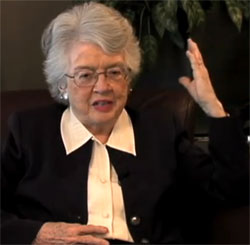| Home | Blog | Ask This | Showcase | Commentary | Comments | About Us | Contributors | Contact Us |

Patricia Wald's poignant Constitutional questionsCOMMENTARY | April 109, 2011On April 14, the Constitution Project honored Judge Patricia McGowan Wald with the 2011 Constitutional Champion Award. Wald was the first woman judge on the U.S. Court of Appeals for the District of Columbia, where she served 20 years, including five years as chief judge, before serving a two-year term to the war crimes tribunal in The Hague. Since then, she has spoken out about such issues as state secrets, DC voting rights, mandatory minimum sentencing and over-incarceration, and "America's dismal descent into the netherworld of prisoner abuse since the tragic events of 9/11." The following is excerpted from Wald’s remarks to the Constitution Society on April 14, 2011. All of you have shared with me what [Supreme Court Justice Oliver Wendell] Holmes [Jr.] called the action and passion of our times and I am grateful. But as Robert Frost said in his latter years, “In three words I can sum up everything I’ve learned about life. It goes on.” And so it does. These are tough, tight, and terrible times and in Polish Solidarity Leader Adam Michnik’s words, “Democracy is a long search for compromise, a market for passions and emotions, hatred and hope. It is a constant imperfection -- a mixture of sin and virtue.” It is in this wind tunnel that NGOs like The Constitution Project and others with whom I have been privileged to work these several post-Court years perform best, creating that space where deeply held beliefs, opinions, and values can compete and mobilize so that governments must listen and take heed: does the Constitution stop at water’s edge; are there groups of people whose fates we control who have no rights at all; can our bloated prisons be allowed to expand indefinitely, must our private lives bow abjectly to technology’s capacity and demands in the name of national security for infinite information; have we really eliminated the vestiges of race and gender discrimination? The NGOs are key players in that search for compromise that lets democracy work but it is compromise not cooption we seek. We see the critical need for these intermediaries right now in the Mideast uprisings which hold so much promise alongside so much anxiety as to where they are headed. A rich and robust civil society is indispensible to responsive government lest “cash and carry” become the mantra for policymaking as well as elections. The nourishment of organizations like The Constitution Project is crucial and another reason why I am so happy to see you all here tonight. Responsible criticism does not just happen and indeed it must endure threats to its own existence: I came to Washington in 1962 in the middle of McCarthyism; I returned to lawyering in the volatile period of the 60s Vietnam dissent; watched the ravages of Watergate and the halting steps toward restoring the credibility of our governing intuitions, and I continue to cast an eagle eye on the attempts in this century to stifle free expression, dissent and the access to information that reasoned opinion must have. Do I have any words of wisdom to impart from my lofty pinnacle of longevity? Not many -- it is possible as Holmes said to live greatly in the law, but it’s getting harder by the year. Compromise as I’ve said is the lifeblood of democracy, but there are some lines in the sands we all have to draw -- that applies to our leaders too. Our victories in the public interest are euphoric, but they are few and brief; most battles have to be refought many times in a single lifetime. No surprise -- I worry about the state of the courts -- federal and state. I recognize that they operate in a political climate, but I wince when I see young able public-spirited lawyers discouraged from public service because anything they do even under the command of their superiors may taint them in the eyes of powerful one issue groups so as to disqualify them forever from service as a judge. In my view that situation is even worse than it was 30 years ago when I was called “wild and wacky” (I’d like to think 830 opinions later the label didn’t stick) and my colleague Ab Mikva was targeted by the gun lobby, but managed to survive because his supporters in and out of the White House and Congress stuck firm -- including members of the opposing party who transcended issue groups to vote on the basis of a candidate’s record, merit, and potential. Only when that happens can we have the vibrant and independent judiciary the constitution anticipated.
|
|||||||||


